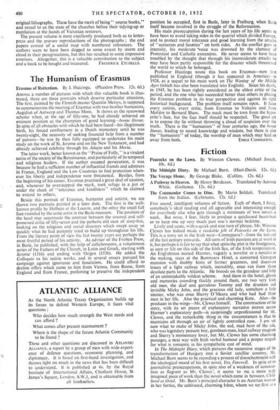The Humanism of Erasmus
Erasmus of Rotterdam. By J. Huizinga. (Phaidon Press. 12s. 6d.) AMONG a number of pictures with which this valuable book is illus- trated, there are three portraits which deserve particular attention. The first, painted by the Flemish master Quentin Metsys, is supposed to commemorate the meeting of Erasmus with two brother humanists, Aegidius of Antwerp and Thomas More. It shows us the renowned scholar when, at the age of fifty-one, he had already achieved an eminent position as the champion of good learning—bonae literae. In spite of all obstacles with which he had been faced—his illegitimate birth, his forced confinement in a Dutch monastery until he was twenty-eight, the necessity of seeking financial help from a number of patrons—he was by then fully equipped to undertake his main study on the work of St. Jerome and on the New Testament, and had already achieved celebrity through his Adagia and his Moria.
The latter work, better known as the "Praise of Folly," is a virulent satire of the society of the Renaissance, and particularly of its temporal and religious leaders. If the author escaped persecution, it was because he had a sufficient number of influential friends and admirers in France, England and the Low Countries to find protection when- ever his liberty and independence were threatened. Besides, from the beginning of his career, Erasmus practised a great deal of caution, and, whenever he overstepped the mark, took refuge in a jest or under the cloak of "tolerance and kindliness" which he claimed to extend to others.
Beside this portrait of Erasmus, humanist and satirist, we are shown two portraits painted at a later date. The first is the well- known profile by Holbein at the Louvre, and the other the small full face rounded by the same artist in the Basle museum. The position of the head may accentuate the contrast between the assured and self- possessed critic of fifty-seven and the pathetic old man of sixty-five, looking on the religious and social disasters which swept away so quickly what he had patiently tried to build up throughout his life. From the literary point of view the last twenty years are perhaps the most fruitful period of his activity. As adviser of the Froben Press, in Basle, he published, with the help of collaborators, a voluminous series of the Fathers of the Church, in Latin and Greek, starting with Jerome (1516) and ending with Origen (1536). He added the Colloquia to his satiric works, and in several essays pursued his campaign against ignorance and fanaticism. He could afford to decline offers which came to him from Vienna, from Rome, from England and from France, preferring to preserve the independent position he occupied, first in Basle, later in Freiburg, when Basle itself became involved in the struggle of the Reformation.
His main preoccupation during the last years of his life seems to have been to avoid taking sides in the quarrel which divided Europe, and to protect moral tolerance and good learning from the attacks of "autocrats and fanatics" on both sides. As the conflict grew in intensity, his moderate *voice was drowned by the clamour of Protestant and Catholic extremists. He never seems to have been troubled by the thought that through his inconsiderate attacks he may have been partly responsible for the disaster which threatened the world to which he belonged. Professor Huizinga wrote this book on Erasmus—now first published in England (though it has appeared in America)—in 1924, as a sequel to his main work on The Waning of the Middle Ages (which has also been translated into English). Since his death, in 1945, he has been rightly considered as the ablest critic of the period, and the one who has succeeded better than others in placing the Erasmus problem in its true perspective and against its right historical background. The problem itself remains open. It faces every satirist, every critic, from Erasmus to Voltaire and from Moliere to Bernard Shaw. The mask must be torn from the hypo- crite's face, but the face itself should be respected. The great art is to expose the lie without throwing a cloud of suspicion over the truth. There is the "humanism" of four centuries ago, the bonne literae, leading to sound knowledge and wisdom, but there is also the "humanism" of today, the worship of man which may lead us


































 Previous page
Previous page